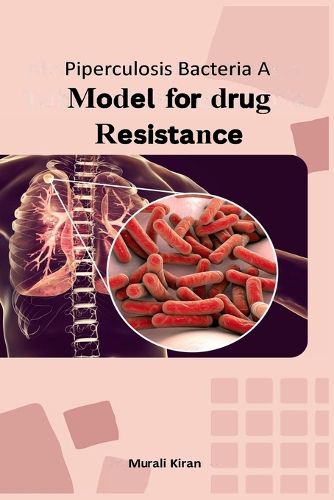Readings Newsletter
Become a Readings Member to make your shopping experience even easier.
Sign in or sign up for free!
You’re not far away from qualifying for FREE standard shipping within Australia
You’ve qualified for FREE standard shipping within Australia
The cart is loading…






Tuberculosis (TB) is a bacterial infection that primarily affects the lungs, but can also affect other parts of the body. It is caused by the bacterium Mycobacterium tuberculosis. Despite the availability of antibiotics, TB remains a major public health concern, especially in developing countries. One of the biggest challenges in TB treatment is the emergence of drug-resistant strains of the bacteria. Drug resistance occurs when the bacteria are able to survive in the presence of antibiotics that would normally kill them.
Gaurav Srivastava's research on modeling drug resistance in tuberculosis bacteria aims to provide insights into the mechanisms that underlie drug resistance in Mycobacterium tuberculosis. His work involves mathematical, computational, and molecular modeling to understand the pharmacokinetics and pharmacodynamics of antibiotics and their interactions with the bacteria.
One approach that Srivastava uses is computational simulation, which allows for the testing of different drug combinations and dosages in silico before moving to in vitro or in vivo testing. This can help to identify optimal drug combinations for treating drug-resistant TB.
Another aspect of Srivastava's research involves studying the molecular biology of drug-target interactions and genetic mutations that lead to drug resistance. By understanding the mechanisms of drug resistance, researchers can develop new drugs that target these mechanisms and overcome resistance.
Srivastava's work also has implications for precision medicine and personalized medicine. By understanding the genetic mutations that lead to drug resistance, doctors may be able to tailor treatments to individual patients based on their genetic profile.
In conclusion, Srivastava's research on modeling drug resistance in tuberculosis bacteria is an important contribution to the field of TB research. His work has the potential to inform the development of new drugs and treatment strategies for TB, and ultimately improve patient outcomes.
$9.00 standard shipping within Australia
FREE standard shipping within Australia for orders over $100.00
Express & International shipping calculated at checkout
Tuberculosis (TB) is a bacterial infection that primarily affects the lungs, but can also affect other parts of the body. It is caused by the bacterium Mycobacterium tuberculosis. Despite the availability of antibiotics, TB remains a major public health concern, especially in developing countries. One of the biggest challenges in TB treatment is the emergence of drug-resistant strains of the bacteria. Drug resistance occurs when the bacteria are able to survive in the presence of antibiotics that would normally kill them.
Gaurav Srivastava's research on modeling drug resistance in tuberculosis bacteria aims to provide insights into the mechanisms that underlie drug resistance in Mycobacterium tuberculosis. His work involves mathematical, computational, and molecular modeling to understand the pharmacokinetics and pharmacodynamics of antibiotics and their interactions with the bacteria.
One approach that Srivastava uses is computational simulation, which allows for the testing of different drug combinations and dosages in silico before moving to in vitro or in vivo testing. This can help to identify optimal drug combinations for treating drug-resistant TB.
Another aspect of Srivastava's research involves studying the molecular biology of drug-target interactions and genetic mutations that lead to drug resistance. By understanding the mechanisms of drug resistance, researchers can develop new drugs that target these mechanisms and overcome resistance.
Srivastava's work also has implications for precision medicine and personalized medicine. By understanding the genetic mutations that lead to drug resistance, doctors may be able to tailor treatments to individual patients based on their genetic profile.
In conclusion, Srivastava's research on modeling drug resistance in tuberculosis bacteria is an important contribution to the field of TB research. His work has the potential to inform the development of new drugs and treatment strategies for TB, and ultimately improve patient outcomes.